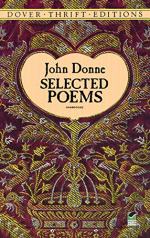|
This section contains 415 words (approx. 2 pages at 400 words per page) |

|
The Bait Summary & Study Guide Description
The Bait Summary & Study Guide includes comprehensive information and analysis to help you understand the book. This study guide contains the following sections:
This detailed literature summary also contains Quotes and a Free Quiz on The Bait by John Donne.
The following version of this poem was used to create this guide: Donne, John. "The Bait." John Donne's Poetry (Norton, 2007).
Note that all parenthetical citations refer to the line number in which the quotation appears.
John Donne is perhaps the most well-known metaphysical poet of the early modern period, as well as the whole of English literature. He was born in London in 1572 to a Catholic family at a time when England was experiencing a tumultuous divide due to religion. England under Elizabeth I was officially Protestant, and as such Catholicism was widely criticized and its followers ostracized. When King James I succeeded Elizabeth I in 1603, Catholics anticipated more tolerant treatment due to the fact that James was the son of famed Catholic and would-be usurper to Elizabeth's throne, Mary, Queen of Scots. James maintained many of Elizabeth's policies toward religion, and as such the confusion and bias over Catholic versus Protestant practice continued. Donne, who had trained at Lincoln's Inn as a lawyer, eventually converted to Protestantism under James I and was named Dean of Saint Paul's in 1621.
Donne's poetry takes immense influence from his religious and intellectual background. His poems are often complex and feature extended metaphors called metaphysical conceits, as well as paradoxical images, concepts, and tones. Donne is also famous for conflating the language and imagery of erotic love with spirituality and the figure of Christ. One can observe a distinct shift in his poetry from his younger years as a lawyer – in which he trended more toward wit, eroticism, and seduction poetry – and his later work, much more concerned with concepts like mortality and one's relationship with God. Still, Donne's repertoire is known, on the whole, as a challenging and highly cerebral repertoire.
"The Bait" features many of the elements for which Donne is most famous. Beginning as a parodical response to Christopher Marlowe's pastoral poem "The Passionate Shepherd to his Love" (written in 1599), "The Bait" opens with a lover propositioning a beloved to run away with him to enjoy a life by the sea. He goes on to say that the fish in the water will flock to the beloved and long to be caught by her, a phenomenon quite different from the methods of other brute and less successful fishermen. Finally, the speaker announces that any fish the beloved does not catch is wiser than himself. "The Bait," using the metaphor of the fisherman, is interested in exploring the power dynamics of romantic love.
Read more from the Study Guide
|
This section contains 415 words (approx. 2 pages at 400 words per page) |

|



